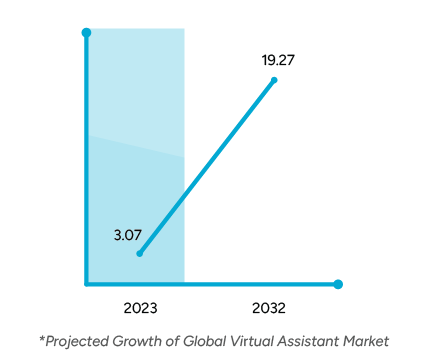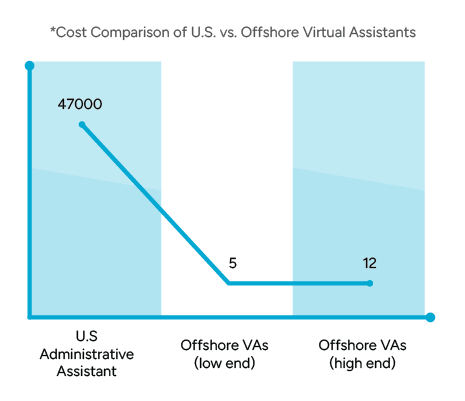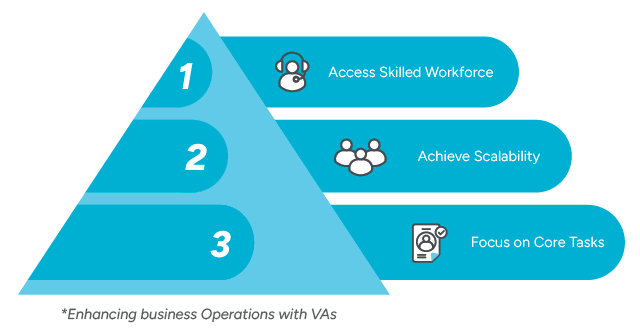How the COVID-19 Pandemic Accelerated the Virtual Assistant Revolution
The COVID-19 pandemic created a perfect storm that forced businesses to rethink how they operate. Lockdowns, remote work mandates, and the collapse of traditional office environments drove companies to seek new, more flexible ways to maintain productivity.
Remote work pushed companies to seek new solutions, and virtual assistants (VAs) quickly became a core part of their response.

Before the pandemic, VAs were mainly used by startups and solo entrepreneurs. But as businesses scrambled to adapt to the new normal, virtual assistants quickly became an essential part of operations. This shift transformed the way companies view staffing and remote work, laying the foundation for a lasting change.
Remote Work as the Catalyst
When remote work shifted from "optional" to "essential" almost overnight, businesses had to adapt quickly to keep operations running smoothly. According to McKinsey, the shift to remote work happened years ahead of schedule—what would have taken 3 to 4 years was compressed into just a few months during the pandemic.
For service-based businesses, the change wasn’t just about sending employees home—it was about keeping operations running without the usual office overhead. Offshore VAs quickly proved to be essential for maintaining business continuity during the pandemic.
Companies quickly realized they didn’t need to hire full-time, in-house staff for every role. Offshore VAs could take on everything from customer support to admin tasks, content management, marketing, and other crucial functions—everything to keep the business running without extra costs.

The global virtual assistant market is exploding. What was worth $3.07 billion in 2023 is projected to hit $19.27 billion by 2032. That's nearly a 6x growth in less than a decade. This is not just a trend—it's a revolution. Businesses that fail to tap into the power of offshore VAs are leaving massive growth potential on the table.
The question is: will you get ahead of the curve, or watch your competition do it first?
Offshore VA as the Cost-effective Lifeline
As businesses reevaluated their cost structures, many turned to offshore VAs to maintain operations without the burden of full-time employees. For example, the Philippines offers skilled, English-speaking professionals at a fraction of the cost of U.S.-based staff.

In the U.S., an average administrative assistant earns about $47,000 per year. Offshore VAs, on the other hand, cost between $5 and $12 per hour. Massive savings that made offshore VAs a no-brainer during the pandemic.
VAs offer unmatched scalability, allowing businesses to adjust their teams quickly based on demand; whether scaling up for a product launch or scaling down during quieter periods.
The Rise of Virtual Assistants
While the pandemic initially pushed businesses to adopt VAs, the shift is now permanent. In fact, the BPO industry, including virtual assistants, was valued at $245.9 billion in 2020 and is set to keep growing rapidly in the coming years.
Here’s why businesses continue to rely on VAs:
Advances in Automation and AI: Today’s VAs are more capable than ever, thanks to AI and automation. Whether it’s scheduling, data management, or even customer interactions, virtual assistants can handle increasingly complex tasks, thus improving efficiency and reducing human error.
Integration with Other Technologies: Virtual assistants are now seamlessly integrated with tools like CRMs, email platforms, and smart devices. This means VAs can automate processes across multiple systems, saving businesses time and boosting productivity.
The takeaway? The shift to using offshore VAs, originally sparked by the pandemic, has become permanent. Virtual assistants are now essential components of everyday business operations.
How Offshore VAs Help Businesses Scale
With VAs becoming an essential part of business operations, companies in industries like e-commerce, digital marketing, and website development are now using them to scale efficiently.

Key benefits of offshore VAs:
Access to a skilled workforce
The Philippines boasts a massive pool of highly skilled, English-speaking professionals who are familiar with Western business practices. Whether you need a social media manager, project coordinator, or customer support rep, there’s a VA for that.
Scalability
Remote VAs allow businesses to scale up (or down) quickly. Need more help during a product launch or peak season? Simply hire more VAs. No long-term commitments, no overhead.
Focus on core tasks
Outsourcing time-consuming, non-core tasks to VAs frees up your in-house team to focus on high-impact activities. That means more time for strategy, product development, and revenue generation.
For example, a web development agency could use offshore VAs to manage client communications, handle support tickets, and execute marketing campaigns. This way frees up developers to focus on building and coding.
Let’s take a closer look at how e-commerce sellers, particularly those on Shopify and Amazon, have leveraged offshore VAs to enhance their operations and drive business growth.
How Shopify Sellers Leverage Offshore VAs
Shopify sellers need to manage multiple aspects of their e-commerce operations. Offshore VAs play a critical role in automating routine tasks, enabling sellers to focus on growing their businesses.
Key Tasks Handled by Offshore VAs for Shopify Sellers:
Customer Support
- Responding to customer inquiries through live chat, email, or phone.
- Handling order issues, returns, and exchanges, ensuring timely resolutions.
- Managing customer feedback and proactively following up to maintain high satisfaction levels.
Product Research & Listings
- Conducting market research to identify trending products, competitors, and pricing strategies.
- Creating product listings with optimized titles, descriptions, images, and relevant tags for search engine visibility.
- Uploading new products, categorizing them correctly, and managing product variants (e.g., sizes, colors).
Marketing
- Scheduling and posting regular updates on social media platforms (Facebook, Instagram, Twitter, etc.).
- Managing email marketing campaigns (e.g., abandoned cart emails, promotions, seasonal newsletters) using tools like Mailchimp or Klaviyo.
- Creating and managing paid advertising campaigns on platforms like Facebook Ads or Google Ads, including budget management and performance tracking.
Order Processing & Fulfillment
- Liaising with suppliers to confirm order statuses and shipment tracking.
- Updating inventory levels in Shopify to avoid overselling.
- Processing and fulfilling orders, ensuring customers receive accurate shipping information and delivery timelines.
By outsourcing these tasks, Shopify sellers can operate their stores efficiently without getting bogged down by daily operational needs.
How Amazon Sellers Leverage Offshore VAs
Amazon sellers face constant pressure to stay ahead of the competition. Offshore VAs help manage essential tasks that contribute to a smooth-running Amazon business, from optimizing product listings to handling customer service.
Key Tasks Handled by Offshore VAs for Amazon Sellers:
Product Listing Optimization
- Writing compelling product titles and descriptions with relevant keywords for Amazon’s search algorithm.
- Conducting thorough keyword research using tools like Helium 10 or Jungle Scout to improve listing visibility.
- Optimizing backend search terms and ensuring that the listings meet Amazon’s style guide and SEO best practices.
Customer Service & Reviews
- Responding promptly to customer inquiries, addressing concerns, and resolving product issues via Amazon's messaging system.
- Monitoring product reviews and feedback, addressing negative reviews with thoughtful responses, and escalating serious issues.
- Managing returns and refunds, coordinating with the fulfillment center (if using FBA) to ensure seamless customer experience.
Inventory & Order Management
- Regularly updating inventory levels on Amazon to prevent stockouts and managing reorder points.
- Coordinating with suppliers and Amazon FBA (Fulfilled by Amazon) centers for restocking.
- Monitoring and reconciling orders, tracking shipments, and updating customers with order status and tracking information.
Amazon Ads & Marketing
- Running and managing Amazon PPC (Pay-Per-Click) campaigns to drive traffic to product listings.
- Conducting A/B testing on ads, adjusting bids, and optimizing keyword targeting to maximize ROI.
- Analyzing performance metrics (e.g., ACOS, click-through rate, conversion rate) and adjusting campaigns for better results.
By outsourcing these specialized tasks to VAs, Amazon sellers can focus on product sourcing, marketing strategy, and scaling their business without getting bogged down in the day-to-day operations.
Adapting to Success with Offshore VAs
The pandemic proved one thing: businesses need to adapt or risk falling behind. Offshore VAs offer a scalable, cost-effective solution that’s here to stay.

If you’re looking to scale your business without the overhead, Virtual Assistants are the way forward. At LevelUp, we connect growing businesses with highly skilled virtual assistants from the Philippines. Let us help you streamline operations, boost productivity, and scale your business efficiently.





